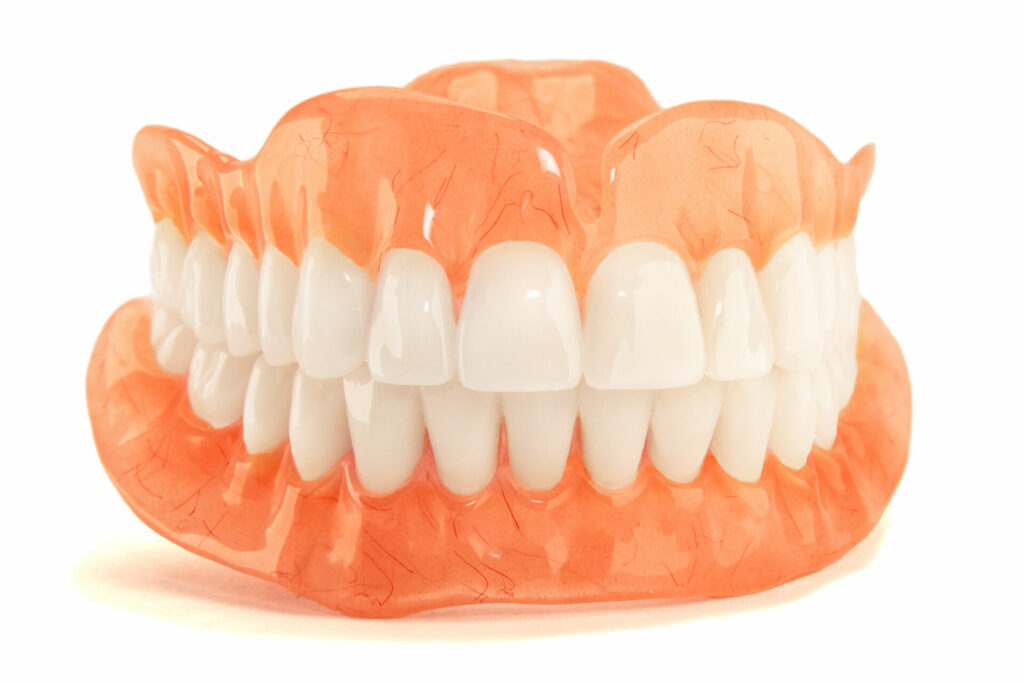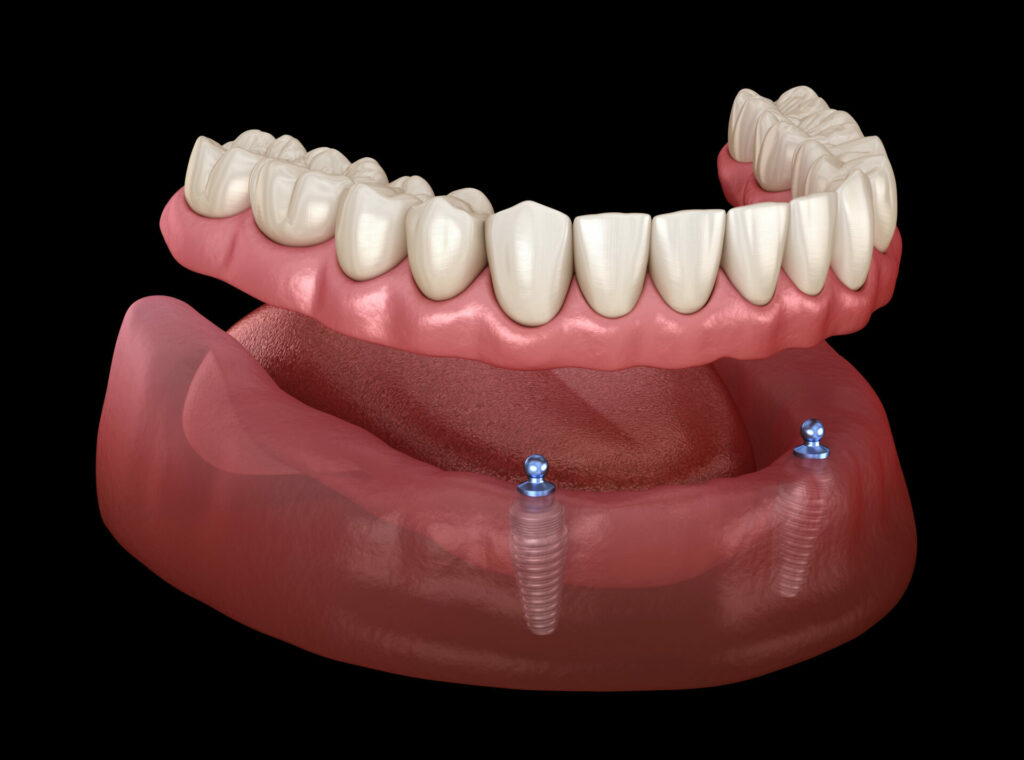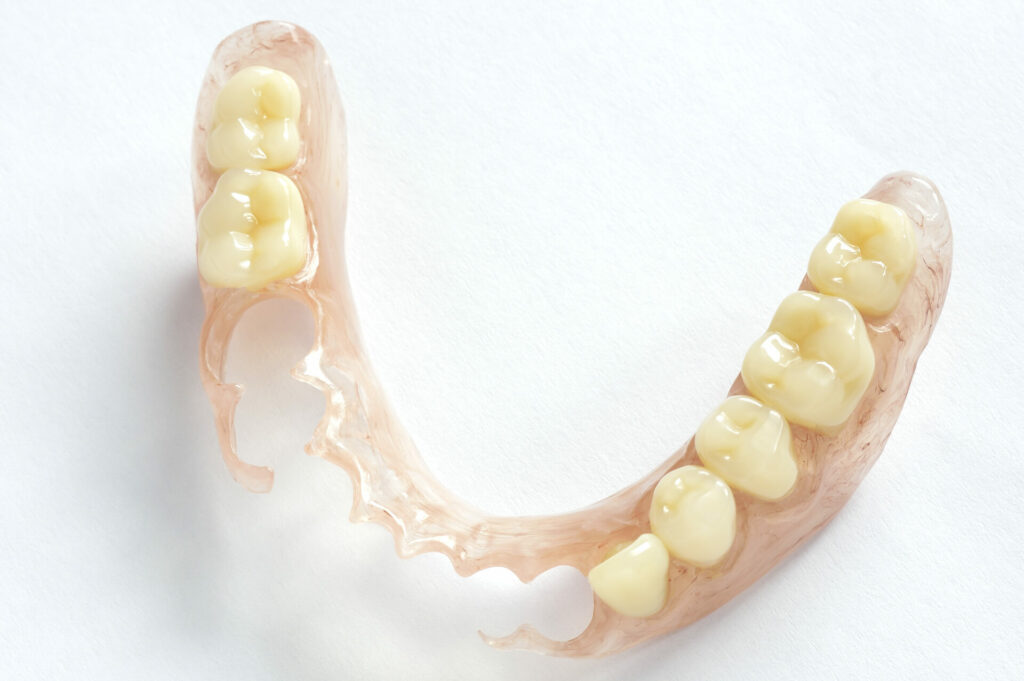Dentures: Restore Your Smile With Confidence
At Intermountain Dental, we understand how missing teeth can impact your confidence, comfort, and overall quality of life. Whether you're missing a few teeth or all of your natural teeth, dentures offer a practical and effective solution for restoring your smile and functionality. Whether you’re interested in traditional dentures or the advanced option of implant- supported dentures, we’re here to help you make the best choice for your oral health and lifestyle.
What Are Dentures?
Dentures are removable dental appliances designed to replace missing teeth and restore your smile. They are custom-made to fit the contours of your mouth, providing a natural appearance and improving the functionality of your bite. Dentures can be made from various materials, including acrylic and metal, and can be either partial (replacing a few missing teeth) or full (replacing all teeth in the upper or lower arch).

Types of Dentures
1.
Implant-Supported Dentures:
A modern solution for those seeking more stability, implant-supported dentures are attached to dental implants that are surgically placed into the jawbone. These dentures offer a more permanent, secure, and natural feeling than traditional dentures.
2.
Partial Dentures:
Used when some natural teeth remain, partial dentures fill in the gaps left by missing teeth. These dentures are typically supported by clasps that attach to remaining natural teeth, ensuring a secure fit.
3.
Full Dentures:
Ideal for individuals who are missing all of their teeth, full dentures rest directly on the gums and are designed to provide a natural appearance. Full dentures are held in place by suction, adhesives, or a combination of both.
Implant-Supported Dentures: The Future of Tooth Replacement
Implant-supported dentures are a revolutionary advancement in denture technology, offering numerous advantages over traditional dentures. They provide a more secure, comfortable, and lasting solution for people who want to enjoy the benefits of dentures without the drawbacks.
What Are Implant-Supported Dentures?

Advantages of Implant-Supported Dentures
1.
Enhanced Stability and Comfort:
Implant-supported dentures eliminate the need for messy adhesives and provide a snug, comfortable fit. The implants anchor the denture securely, preventing slippage while chewing or speaking. This level of stability allows you to enjoy your meals and socialize with confidence.
2.
Improved Functionality:
Because the implants integrate with your jawbone, implant supported dentures offer better biting and chewing power than traditional dentures. You can enjoy a wider variety of foods without worry, from crunchy vegetables to chewy meats.
3.
Preservation of Jawbone Health:
One of the key benefits of implant-supported dentures is their ability to prevent bone loss. When you lose teeth, the jawbone can begin to shrink over time. Dental implants help stimulate the jawbone, preserving its structure and preventing the sunken look that often accompanies traditional dentures.
4.
Long-Lasting and Durable:
With proper care, implant-supported dentures can last for many years—often much longer than traditional dentures. The dental implants themselves can last a lifetime, while the dentures may need to be replaced or relined periodically.
5.
Natural Appearance:
Implant-supported dentures provide a more natural-looking smile, as they are securely anchored and mimic the appearance and function of natural teeth. Since they don’t rely on clasps or adhesives, they offer a more aesthetically pleasing result.
6.
No Need for Denture Adhesives:
Traditional dentures often require adhesives to stay in place. With implant-supported dentures, these adhesives become unnecessary, making your dentures more comfortable and hassle-free.
Are Implant-Supported Dentures Right for You?
Implant-supported dentures are an excellent option for many people, but not everyone is a suitable candidate. To be eligible, you must have sufficient bone density in your jaw to support the implants. If you have experienced significant bone loss, we may recommend a bone grafting procedure before proceeding with implant placement.
A consultation with our experienced dental team will help determine whether implant-supported dentures are the right choice for you. During this appointment, we’ll evaluate your oral health, discuss your goals, and develop a personalized treatment plan.
Full Dentures: A Comprehensive Solution for Missing Teeth
Full dentures are used when all teeth are missing in either the upper or lower arch (or both). They rest on the gums and are held in place with suction or adhesive.
The Benefits of Dentures
- Restores Functionality: Dentures allow you to chew food properly, improving nutrition and digestion.
- Improves Appearance: Dentures fill out your facial profile and restore your smile, enhancing your overall look.
- Enhances Speech: Missing teeth can cause slurred or unclear speech, but dentures help restore normal speech patterns.
- Boosts Confidence: Having a full set of teeth improves self-esteem and allows you to smile freely.

Partial Dentures:
Partial dentures are removable dental appliances designed to replace one or more missing teeth. They are custom-made to fit your mouth, improving both the look of your smile and your ability to chew and speak comfortably.
Traditional Partial Dentures
- Made from acrylic or metal, these dentures consist of a base that supports one or more artificial teeth.
- They are held in place with clasps that attach to your natural teeth, offering a stable and durable fit.

Benefits of Partial Dentures
- These dentures are crafted from a flexible, lightweight resin or nylon material that adapts to the shape of your mouth.
- With no metal clasps, flexible partials provide a more natural appearance, are comfortable to wear, and tend to fit more snugly than traditional options.
- Ideal for patients with sensitive gums or those looking for a more aesthetic solution.
How to Get Partial Dentures
The process begins with a thorough consultation and examination. Your dentist will take impressions of your mouth to ensure a precise fit. After designing your custom dentures, you’ll return for a fitting and adjustments to ensure comfort and proper function.
Caring for Your Dentures
Whether you choose traditional or implant-supported dentures, proper care is essential to maintain their appearance and function. Here are some tips:
Clean daily:
Use a soft-bristled brush and non-abrasive cleanser to clean your dentures.
Remove at night:
Always remove your dentures before bedtime to give your gums a rest.
Rinse after meals:
Rinse your dentures with water after eating to remove food particles.
Regular checkups:
Schedule regular dental visits to ensure your dentures continue to fit well and your oral health is maintained.
